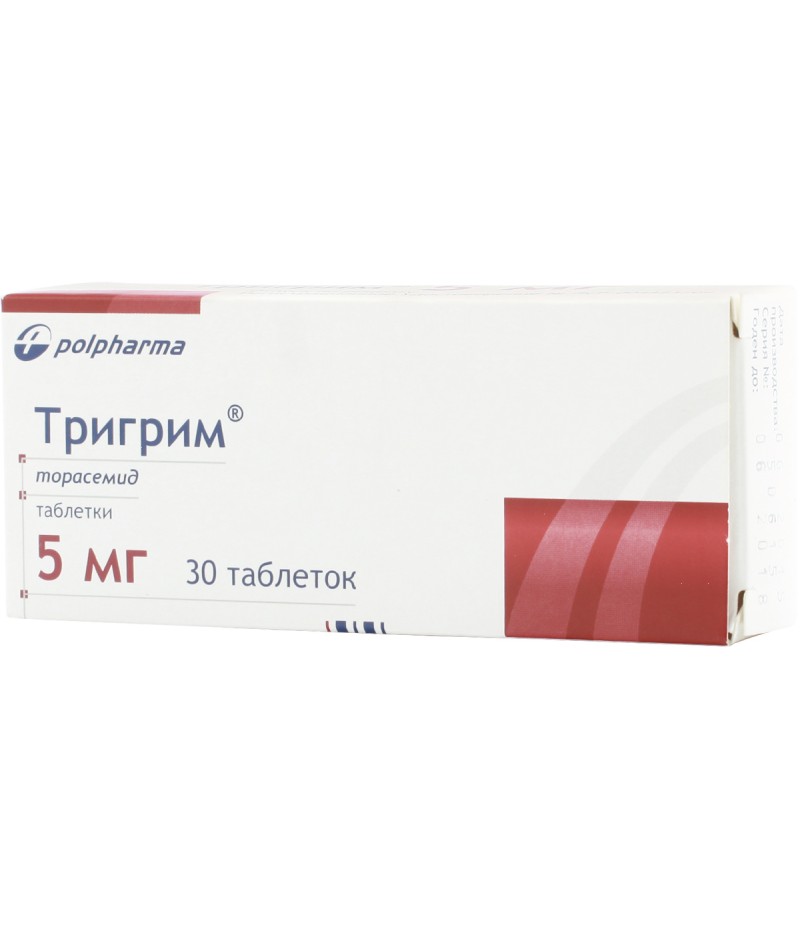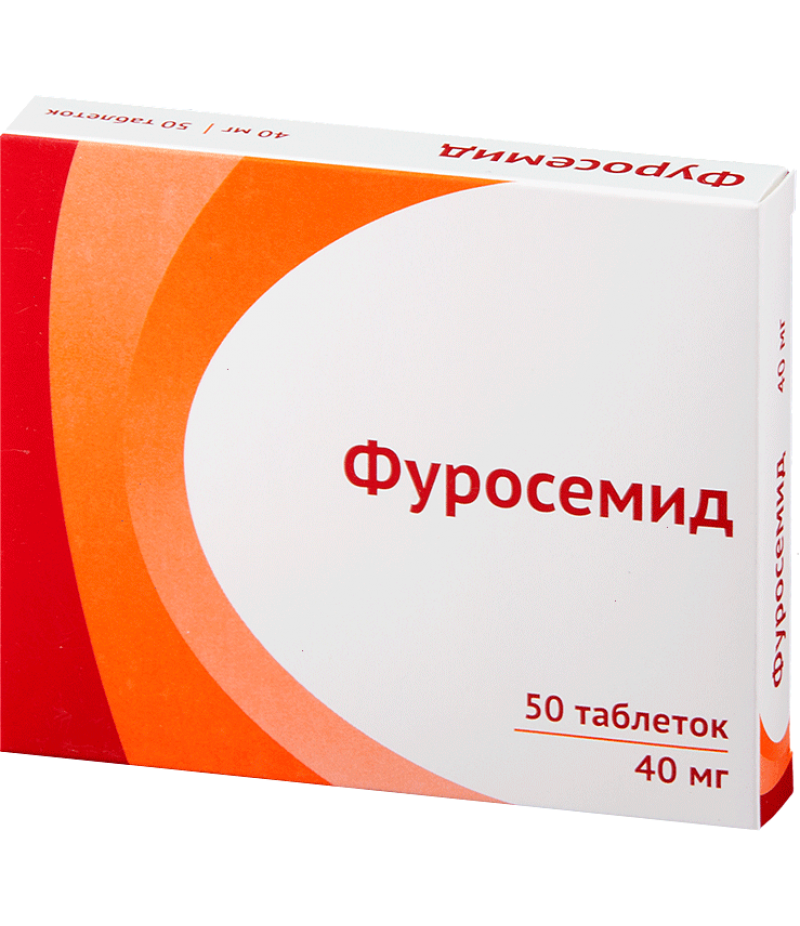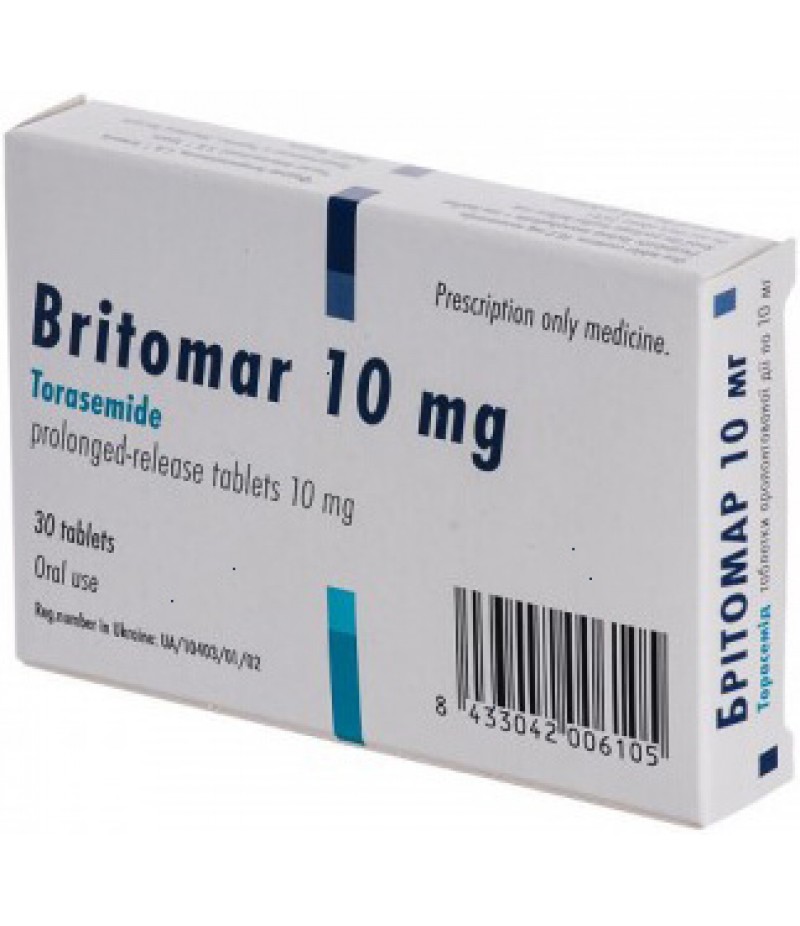Trigrim 5mg #30
- $17.42
- 3 or more $16.50
- Availability:In Stock
User manual for TrigrimYou can buy Trigrim on this pageTablets Trigrim are a representative of the clinical and pharmacological group of medicines diuretic drugs (diuretics). They are used to reduce the volume of circulating blood..
Tags: tabs
User manual for Trigrim
You can buy Trigrim on this page
Tablets Trigrim are a representative of the clinical and pharmacological group of medicines diuretic drugs (diuretics). They are used to reduce the volume of circulating blood or swelling of tissues for various pathologies.
Description of dosage form, composition
Tablets of Trigrim are round and biconvex (for a dosage of 2.5 mg) or planocylindrical (for dosage of 5 and 10 mg) surface. The main active substance of the drug is torasemide, its content in one tablet is 2.5, 5 and 10 mg. It also includes auxiliary components, which include:
Colloidal silicon dioxide.
Lactose.
Magnesium stearate.
Corn starch.
Tablets Trigrim packaged in a blister for 10 pieces. Cardboard pack contains 3 blisters (30 tablets), as well as instructions for the use of the drug.
Therapeutic effects, pharmacodynamics
The main active ingredient of the Trihydram torasemide tablets has a diuretic (diuretic) effect, which is realized due to the inhibition of the reverse absorption of sodium and potassium ions in the distal sections of the renal tubules. This leads to an increase in the osmolar pressure of urine and an increase in its volume. The drug partially leads to the removal of potassium salts from the body, but this occurs to a lesser degree than with the use of furasemide.
After taking the Trihydrim tablet inside the torasemide quickly and almost completely (bioavailability exceeds 80%) is absorbed into the systemic bloodstream from the small intestine. Its maximum concentration in the blood is determined after only 1-2 hours. It is evenly distributed in the tissues and metabolized in the liver with the formation of inactive decay products, which are excreted mainly in the urine.
Indications for use
Receiving of tablets Trigrim is indicated for the complex treatment of arterial hypertension (high blood pressure), the purpose of which is to reduce the volume of circulating blood. Also, the drug is used to reduce the severity of edema of soft tissues of various locations and origin (edema caused by heart failure, cirrhosis, kidney or lung pathology).
Contraindications to use
Receiving tablets Trigrim is contraindicated with several pathological and physiological conditions of the body, which include:
A marked decrease in the functional activity of the liver with the development of hepatic precoma or coma.
Anuria is a condition in which the excretion of urine stops.
Chronic insufficiency of the functional activity of the kidneys, accompanied by an increase in the concentration of nitrogen-containing compounds in the blood (azotemia).
Violation of the rhythm of contractions of the heart (arrhythmia).
Reduced blood pressure (arterial hypotension).
Hypersensitivity to compounds of chemical derivatives of sulfonamide, which can cause a cross allergy to torasemide.
Individual intolerance to any of the components of the drug.
The patient's age is less than 18 years.
Pregnancy and the period of breastfeeding (lactation period).
With caution, the drug is used with concomitant diabetes, gout, disturbed water-electrolyte state, insufficiency of the functional activity of the liver and kidneys of mild or moderate severity, a predisposition to increase the level of uric acid. Before the appointment of tablets Trigrim the doctor must be sure that there are no contraindications.
Correct use, dose
Tablets of Trigrim are intended for oral administration (oral administration). They are taken inside regardless of food, do not chew and drink with enough water. Dosage and mode of reception depend on the indications:
Elevated blood pressure - the initial dosage is 2.5 mg, if necessary, it can be increased to 5 mg once a day. Further increase in dosage no longer has the proper therapeutic effect. It develops usually after a period of 12 weeks from the start of the course of therapy.
Edema caused by cirrhosis of the liver - the initial dosage is 5-10 mg once a day, then it increases to a value at which the necessary diuretic effect is achieved, but not more than 40 mg per day.
Chronic renal failure, accompanied by the development of edema - the initial dosage is 20 mg 1 time per day. If necessary, it increases to a maximum value, which should not exceed 200 mg per day.
Congestive heart failure - therapy starts with a dosage of 5-20 mg per day, then it can be increased, but should not exceed 200 mg.
In general, the doctor prescribes the dosage, regimen and duration of use of the drug for each patient individually.
Side effects
Against the background of taking tablets Trigrim, it is possible to develop adverse adverse reactions from various organs and systems:
The digestive system - dry mouth, deterioration of appetite, dyspeptic symptoms (nausea, bloating, unstable stools), reversible increase in liver enzymes transaminase activity, indicating excessive functional load on liver cells (hepatocytes).
Nervous system - headache, accompanied by periodic dizziness, drowsiness, confusion, general weakness, spasms of skeletal striated muscles, a violation of the sensitivity of the skin (paresthesia) of the extremities.
Cardiovascular system - decrease in the level of systemic arterial pressure (arterial hypotension), circulatory disturbance, accompanied by intravascular thrombus formation (thromboembolism).
Organs of the senses - impaired vision, hearing loss down to deafness.
Urinary system - increased levels of urea, creatinine in the plasma, acute retention of urination.
Blood and red bone marrow - decrease in the number of erythrocytes, platelets, white blood cells per unit volume of blood.
Metabolism is a pronounced decrease in the volume of fluid in the body (hypovolemia), potassium ion concentrations (hypokalemia), increased glucose, lipid and uric acid levels in the blood.
Allergic reactions - rash on the skin, itching, photosensitivity (inflammatory reaction in response to exposure to sunlight).
If there are signs of development of negative side reactions, taking Trigrim tablets should be discontinued and consult a doctor who will determine the possibility of further use of the drug or adjust the dosage.
Features of use
Prior to the appointment of Trihydrim tablets, the doctor must carefully read the instructions, and draw attention to several features of the correct use of this medication, which include:
Prolonged use of the drug requires periodic laboratory monitoring of the acid-base state, the level of basic minerals, glucose, lipids, uric acid in the blood, as well as indicators of the functional activity of the liver and kidneys.
With caution, the drug is used for gout, as this leads to an increase in the level of uric acid in the blood.
With concomitant diabetes, periodic laboratory testing of the sugar level and correction of the dosage of hypoglycemic drugs or insulin, if necessary, are required.
At some pathological conditions (gipokaliemia, gipovolemia) before appointment of a preparation correcting pathogenetic therapy is spent.
The active components of the Trihydrim tablets can interact with drugs from other pharmacological groups, so their physician should be warned about their possible use.
The appearance of signs of oppression of bone marrow hemopoiesis is the basis for the withdrawal of the drug.
At the first time after the beginning of the course of therapy with the drug, it is recommended to abandon the performance of work, which is associated with the need for sufficient concentration of attention and speed of psychomotor reactions.
In the pharmacy network, Trihydrim tablets are dispensed on prescription. To prevent complications or severe consequences, it is not recommended to take this medication independently without the appropriate doctor's prescription.
Excess dosage
There is no typical clinical symptomatology of excess of the therapeutic dosage of Tablets. Usually, this is accompanied by a significant increase in diuresis, a decrease in blood pressure, hypovolemia, a violation of the mineral balance, acidity of the blood, which is accompanied by severe functional changes in the cardiovascular and nervous system. Treatment of overdose is symptomatic and pathogenetic. It is primarily aimed at restoring the volume of fluid in the body, as well as the concentration of mineral salts.
Proper storage
The shelf life of the tablet is 3 years. It is important to keep them in intact original packaging, dark, dry, inaccessible to children at an air temperature of no more than + 25 ° C.



